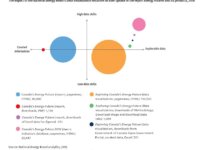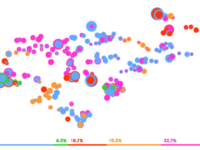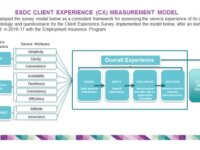The South Holland provincial authority is looking for ways to make the energy transition towards carbon neutrality a standard consideration in all its infrastructure management and maintenance activities. The province wants innovation to be a structural part of these activities, which has already produced the ‘N211 generates energy’ and ‘N470 generates energy’ projects.
Innovation Tag: Experimentation
The digital economy is booming in Medellín. So is digital tax evasion. To identify potential tax evaders, the local treasury department used to detect unregistered online stores manually. Since the use of social media for economic activities has grown exponentially, the agency has now developed a bot that automatically scrapes Instagram for such stores - and officers can use their time instead to work with store owners to formalize their businesses.
In 2016 the NEB launched the Data Visualization Initiative to face the challenge of producing usable and useful data to go beyond using new technologies to deliver better service to citizens. It created multiple products from the same information to expand public participation in the energy dialogue and enable evidence-based decision-making. These products include interactive data visualizations and other materials, such as high school lesson plans, as a new way to engage experts and nonexperts.
Converlens emerged from the Australian government’s 2017/18 Business Research and Innovation Initiative (BRII) "Digitally enabled community engagement in policy and programme design" challenge. The BRII challenge linked into OGP Australia’s first National Action Plan. Deploying artificial intelligence (AI) to provide a smart layer of qualitative natural-language processing techniques (NLP), Converlens assists people in government to excel at managing the submissions and communications…
Case Study
Future Skills: Engaging governments and stakeholders to build a skills development ecosystem
Future Skills is part of the Government’s plan to build a resilient and confident workforce that reflects Canada rapidly evolving nature of work. It embraces user-centred design principles to inform the adoption of proven practices and evidence on skills development approaches, to ensure that Canada’s policies and programs are prepared to meet Canadians’ changing needs. It was designed in collaboration with provincial and territorial governments, and informed by a large range of…
The Client Experience Measurement Survey Model was developed by Employment and Social Development Canada to gather and analyse client feedback to improve service delivery to its clients. Canadians have been able to express their views on government programs and services, which have informed the way programs and services are designed and delivered. The survey allows the tracking of service satisfaction, ease of access, effectiveness of service delivery, and the experience of particular programs…
synAthina is the common space which brings together, supports and facilitates citizens’ groups engaged in improving the quality of life in the city.
synAthina's aim is to support the activities of the citizens the City and create a new perception about the relationship between civic society and local governance and cultivates their dynamic, bidirectional bond.
synAthina platform has brought a new era of social innovation in Athens, bringing new perspectives and approaches to bear on…
The air-purifying billboard is a Macedonian innovative prototype that aim to clean the ambient air mainly polluted from traffic. There are currently 2 pilot billboards implementing this technology.
The vacuum cleaning based solution, if set to all 820 billboards in Skopje can reduce air pollution by up to 20%, as the filter can purify 2.5 million cubic meters of air per month. The filters can absorb the PM10, PM 2.5 and other harmful particles. Around 200,000 bus passengers and 150,000 more…
All cars on Australian roads must have compulsory insurance (CTP). In the ACT, this insurance was expensive, coverage limited, and most claims needed to be settled in the courts. democracyCo designed and delivered a Citizens’ Jury and extensive stakeholder engagement process to develop a improve the scheme. Over 7 months 50 Canberrans worked with a group of stakeholders to design the improved scheme, which the Government committed to implement.
The frameworks for creating and managing the rule of government, as reflected in policies, legislation and regulation, are still based on a paper paradigm. In a digital world this creates poor service experiences and often the intent of a policy is not achieved. Instead if we co-design authoritative machine-consumable rules we can provide better services for citizens, better delivery of policy intent, and enable communities, NGOs and private sector to be part of a government service ecosystem.





